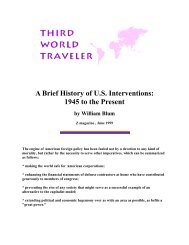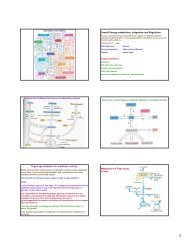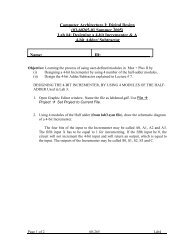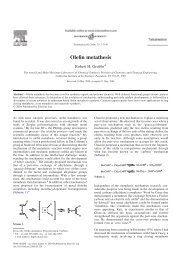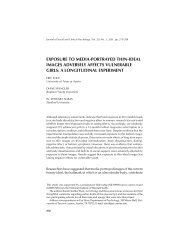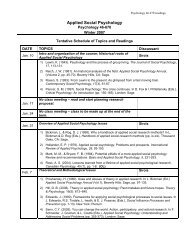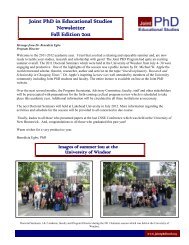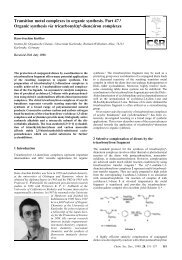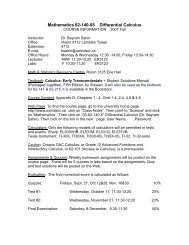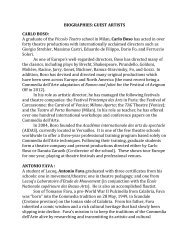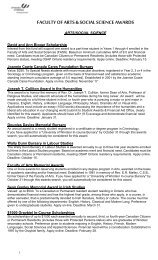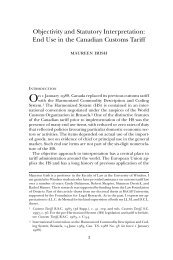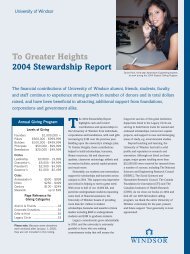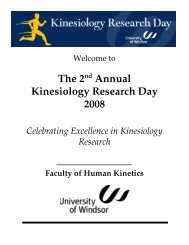Critical Social Work - University of Windsor
Critical Social Work - University of Windsor
Critical Social Work - University of Windsor
You also want an ePaper? Increase the reach of your titles
YUMPU automatically turns print PDFs into web optimized ePapers that Google loves.
Brown<br />
difference remain intact, differences are seen as self-evident. Within this approach, the<br />
foundation <strong>of</strong> knowledge itself has failed “to see anything but its own preconceptions” (Crosby,<br />
1992, p.133). Crosby states:<br />
It is impossible to ask how “differences” is constituted as a concept, so<br />
“differences” becomes substantive, something in themselves - race, class, gender -<br />
as though we knew already what this incommensurate triumvirate means! (1992,<br />
p.137). ....That is, knowledge, if it is to avoid the circularity <strong>of</strong> ideology, must<br />
read the process <strong>of</strong> differentiation, not look for differences (1992, p.140).<br />
Processes which idealize difference do not necessarily deal with the mechanism <strong>of</strong><br />
oppression (Alc<strong>of</strong>f, 1988). Alc<strong>of</strong>f (1988) states: "The mechanism <strong>of</strong> power referred to here is<br />
the construction <strong>of</strong> the subject by a discourse that weaves knowledge and power into a coercive<br />
structure that "forces the individual back on him and ties him to his own identity in a<br />
constraining way” (p. 415). Feminism for example, has <strong>of</strong>ten treated categories <strong>of</strong> men and<br />
women as fixed, immutable, or essential, frequently employing an already fully constituted and<br />
essentialist category <strong>of</strong> "Woman". The current focus on difference and diversity has produced<br />
important questions on how we can talk about social categories (Butler, 1992; Riley, 1988,<br />
1992). Butler (1992) and Riley (1988, 1992) had a powerful impact <strong>of</strong> feminism when they<br />
questioned the category <strong>of</strong> gender itself. Butler suggests that we “relieve the category <strong>of</strong> its<br />
foundational weight in order to render it a site <strong>of</strong> permanent political contest” (1992, p.8).<br />
Radical and cultural feminists <strong>of</strong> the 1970‘s and 1980’s were critiqued for gender<br />
essentialism by other feminists. For instance, while acknowledging the role <strong>of</strong> cultural factors<br />
and socialization in understanding gendered experiences, feminist therapists such as Worell and<br />
Remer (1992) who invoked the notion <strong>of</strong> “feminine values” and the relational therapists <strong>of</strong> the<br />
Boston Stone Center (Baker-Miller, 1976; Surrey, 1991) who emphasized a “self-in-relation”<br />
women’s psychology different from men’s more individualist psychology, were critiqued for<br />
their overly determined and thus limiting notion <strong>of</strong> gender. Such approaches are faulted for<br />
presuming that people live fully, rigidly, unambiguously within binary divides and that there is<br />
no fluidity or movement among ascribed gender traits. Reifying rather than challenging binary<br />
gender constructions are thought to be helpful to a feminist agenda toward gender equality, and<br />
the greater possibility <strong>of</strong> gender expression.<br />
bell hooks (1995) raises similar concerns for radical Black politics recognizing a tension<br />
between the need for "reformulating, outmoded notions <strong>of</strong> identity”, and challenging the need to<br />
critique “notions <strong>of</strong> universality and static over-determined identity” while arguing for the<br />
“formation <strong>of</strong> radical black subjectivity”. She further argues that there is a need to acknowledge<br />
a “difference between a repudiation <strong>of</strong> the idea there is a black “essence” and recognition <strong>of</strong> the<br />
way black identity has been specifically constituted in the experience <strong>of</strong> exile and struggle”<br />
(1995, p. 122). Again we see a desire to both preserve and reject elements <strong>of</strong> identity<br />
construction.<br />
By exploring the limitations <strong>of</strong> oppositional and dominant social discourses one can<br />
discover what is left out <strong>of</strong> the story or rendered invisible (Rossiter, 2005). Dominant discourses<br />
requires ongoing taken for granted participation for their reproduction (Pozutto, Angell, &<br />
<strong>Critical</strong> <strong>Social</strong> <strong>Work</strong>, 2012 Vol. 13, No. 1<br />
48



